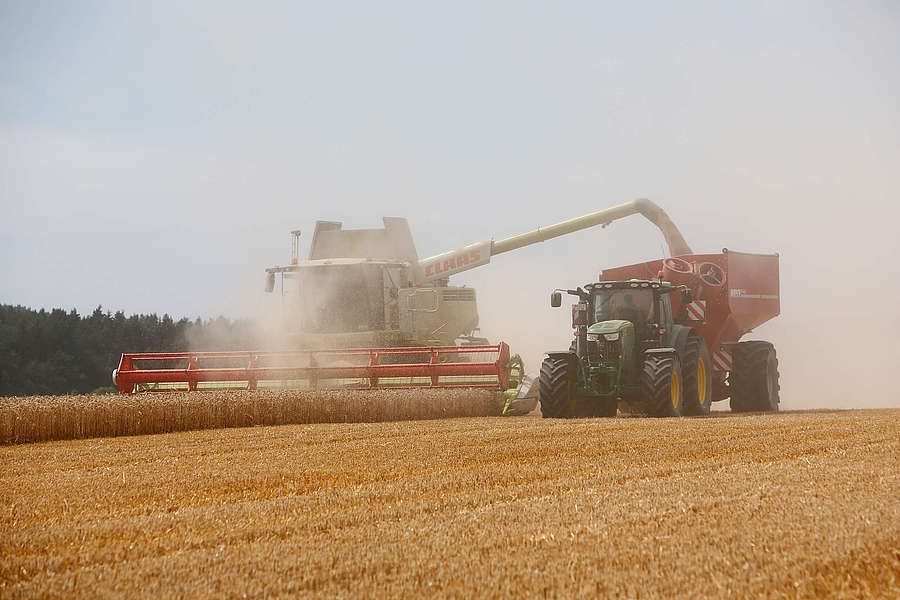Open to new ideas
Marco Horsch, DE
The agricultural sector is facing an enormous change – caused not only by political pressure, but also by the pressure of society. Cultivation methods that so far have proven their worth are questioned to an increasing degree and a lot of farmers strike new paths regarding the cultivation of their fields. Marco Horsch is one of them.
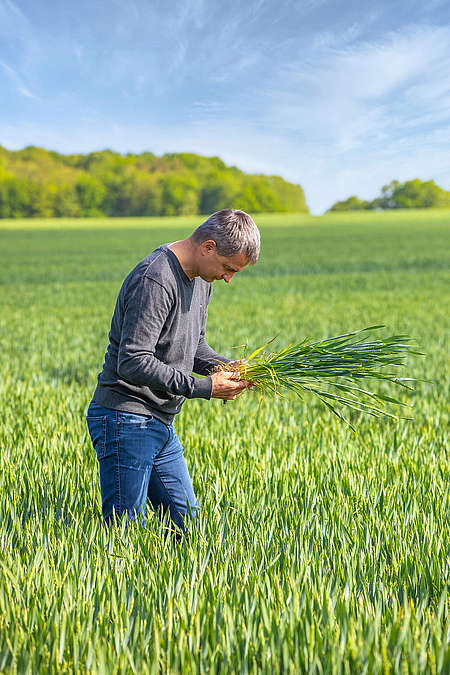
He took over the agricultural family farm at Sitzenhof. Moreover, he together with Joachim Suttor manages the company Bintec. The Sitzenhof-based company sells professional solutions for grain storage. Marco Horsch and one employee cultivate 300 ha of arable land - among them 80 ha he cultivates in contract for other farms. On the whole farm he works with a 5-part rotation. The individual fields have been combined to cultivation blocks.
“My machinery park is rather lean. The only own machines I use on my farm are tractors“, Marco Horsch explains. Harvest and sowing technology as well as tillage machines are shared with local machine co-operatives. For him, the basic idea of regional farming is very important, and he supports it by his membership in the co-operatives.
“Mutual consideration is indispensable in the machine co-operative. And it works excellently. Our threshing co-operative is a good example. During the harvest every single member is aware that one’s own interests have to step back. We all pull together and try to coordinate everything in such a way that we all are able to bring in the harvest as well and as quickly as possible. But this means that you might have to wait one or two days until it’s your turn!” All the farmers of the co-operative harvest about 500 ha of cereals and rape with one combine. On his own fields, Marco Horsch deliberately only uses smaller and lighter tractors to keep the weight on the fields as low as possible and to preserve the soil. The other members of the co-operative partly proceed differently.
Marco Horsch’s self-propelled plant protection sprayer he uses on the farm has been built in 1989. The PT 150 is one of the first and one of the oldest self-propelled sprayers that has ever been built by HORSCH. The working width is 24 m and over the years the sprayer has been updated several times.
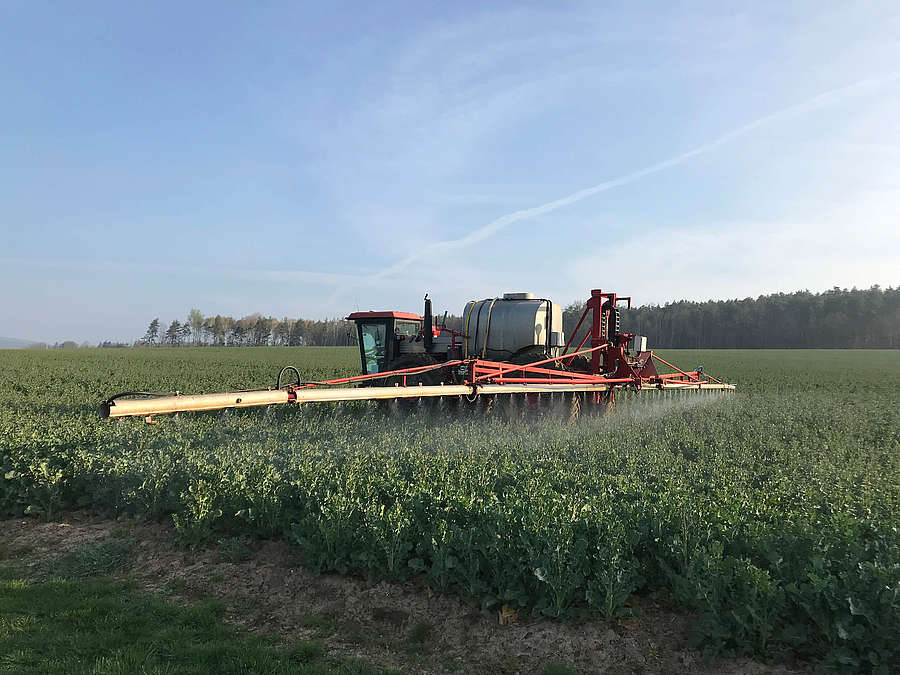
Marked by the ideas of the family
As an adolescent Marco Horsch experienced the beginnings of the HORSCH Maschinen GmbH and, moreover, was influenced considerably by the ideas of his family with regard to conservation tillage. He grew up in the height of minimum tillage and at that time learned that this type of cultivation method quickly reached its limits in Schwandorf and its surroundings. To this day, he still concentrates intensely on the soil and tries to find ways how to optimise the cultivation of his fields even further. He says: ”I am not interested in prescription farming. I want to try new things and gather my own experiences. I want to enjoy my work, even if I already know beforehand that one of my numerous field tests might fail. Despite all this I know that my kind of farming has to pay off from a financial point of view and that I have to earn money with it.“ At the moment, it comes in handy that a diversified rotation is eligible and he, thus, has a financial benefit. Another advantage of a 5-part rotation is that there are less problems with weeds on his fields. His rotation is: cereals, rape, cereals, maize, then a spring crop with flowering crops or leguminous crops. His previously intensive rotation is now mixed up with leguminous crops and maize. Formerly, the rotation exclusively consisted of wheat and rape. Harvest and sowing times thus were marked by an enormous amount of work and a lot of stress. The 5-part rotation reduces his workload significantly. Treatment, harvest or sowing do not have to be carried out all in the same period and working hours can be organised much better.
“I experiment a lot with regard to the cultivation of catch crops. I for example do not grow them on the whole field, but on only one half of the field. My objective is to assess the influence on the yield of the following crops”, he explains. He deliberately does not grow charlock as a catch crop to exclude any incompatibilities with rape. Rape still is the predominant leaf crop in his rotation. For some years he has been growing soya – not only to mix up his rotation even further, but also to support regional agriculture. So far the results have been satisfying: ”The yield ranges between 3.5 and 4.5 tons. After the harvest, the soybeans are pressed and the resulting oil is sold exclusively in the region.”
Though it is not Marco Horsch’s intention to convert his farm to organic farming, he still wants to test some organic farming approaches on this farm. Especially when it comes to the soil. The more he deals with this topic the more he realises why minimum tillage in the 80’s reached its limits in Schwandorf and its surroundings. “At that time, we only had very short rotations. We thus destroyed all advantages we had gained by using minimum tillage. Today I think that is essential to loosen the soil deeply. Moreover, it was a mistake to keep the soils black and it still is today. Not only the catch crops themselves are important to build up humus, but also the root exudates. Periods when no crops are grown have to be used to build up humus with catch crops. If we had known this back in the 1980es, minimum tillage surely would have been more successful.” However, Marco Horsch also admits that on some of his own fields there still is a lot of potential with regard to the humus content. He focuses on how he can build up humus in the soil while at the same time achieving a positive economic effect.
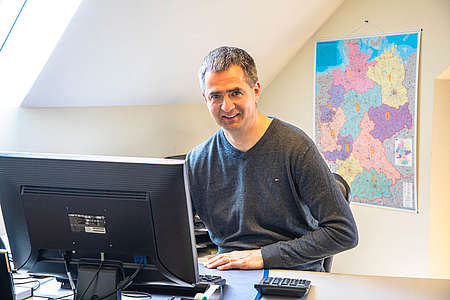
About Marco Horsch
Marco Horsch is the youngest brother of Philipp and Michael Horsch. He runs the agricultural family farm at Sitzenhof in Schwandorf. He is married to a Canadian. The couple has two sons. Marco Horsch and his wife have been living in Canada for 1.5 years. That’s where he developed the idea to found the company Bintec, his second mainstay besides the farm. He attaches great importance to the encouragement of regional agriculture and the realisation of new ideas. He is also open to the cultivation of special crops.
Industrial hemp as a rotation supplement
To increase the humus content in his soils, he does not only experiment with catch crops, but also plans to sow under seed in maize. In the future, the diversity on the agricultural land will increase considerably. To achieve this aim he is not afraid of striking new paths. Last year, for example, he started to grow industrial hemp. “A young employee from the HORSCH marketing department approached me. Beside his job at HORSCH he had founded a regional start-up that processes the seed of industrial hemp into food. He asked me if I could grow part of the industrial hemp. I am always open to new ideas and it was a possibility to support a young regional company. So I decided rather quickly that I was going to help him. In the first year I grew 10 ha of hemp. I could integrate it quite easily into my rotation plan by converting some of the leguminous crop fields to industrial hemp.” With a grain yield of 1 t per hectare the harvest was successful, but not easy. It was not possible to chop the plants with the combine he used and they were spread on the field without having been chopped. This turned out to be a huge mistake. The incorporation was very difficult and could only be managed with a HORSCH Tiger MT. This cultivator is a combination of a heavy disc harrow and a tine section for deep loosening. To incorporate the hemp, he used only the discs. Unfortunately, the result of this approach was that the field did not get very level because of the huge amounts of hemp straw that lay there in swaths. Especially with regard to plant protection or fertilisation this is not very comfortable for the driver. This year again he grows industrial hemp and Marco Horsch wants to learn from the mistakes of the past. He plans to grow a spring crop after the hemp has been harvested. He thus has more time to incorporate the harvest residues intensely into the soil. This time he will have them dried before incorporating them. Moreover, some of the combine settings have been optimised to manage harvest even more smoothly. From an economic point of view growing industrial hemp paid off last year. The high competitiveness suppresses weeds and grass weeds. No plant protection treatments are required, and it is not necessary to apply fertiliser. Industrial hemp, thus, is a real gain – for rotation as well as for the farm profits.
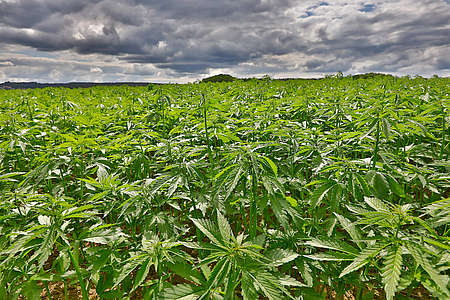
Alternative plant protection measures
One of Marco Horsch’s other targets is to reduce the use of plant protection agents and to rely more on alternatives like fermenters in the future. “I regularly exchange experiences on this subject with other farmers. A lot of them have developed their own methods to produce ferments. This sector still is in its infancy, there aren’t any scientifically tested methods yet.” According to Marco Horsch this development might help to shed a different light on agriculture. In the future farmers have to manage to reduce plant protection agents, save on fertilisers and still keep the yields on a constant level. Due to the formation of humus CO2 is captured in the soil and farmers, thus, can contribute significantly to improve the climate. Marco Horsch, however, emphasis explicitly that these advantages have to be communicated actively. In his opinion, farmers should have talked more openly about their work in the past – also about the mistakes that have been made. “At the moment, the agricultural sector is in an exciting stage as it has to re-define itself. I myself have used prescription farming for years and relied too much on science and consultants. It worked very well, but I unlearned to think for myself. Especially in the plant protection sector a lot of things fell by the wayside. I now have reached the point that I try to find out which options I have beside prescription farming”, Marco Horsch summarises at the end of the interview.
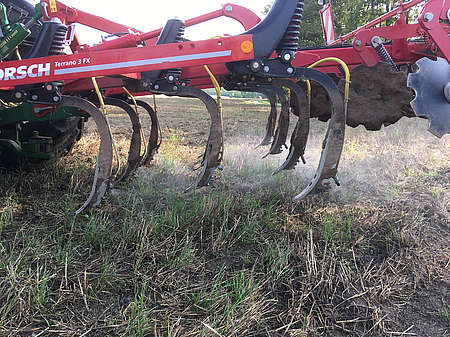
According to Marco Horsch this development might help to shed a different light on agriculture. In the future farmers have to manage to reduce plant protection agents, save on fertilisers and still keep the yields on a constant level. Due to the formation of humus CO2 is captured in the soil and farmers, thus, can contribute significantly to improve the climate. Marco Horsch, however, emphasis explicitly that these advantages have to be communicated actively. In his opinion, farmers should have talked more openly about their work in the past – also about the mistakes that have been made. “At the moment, the agricultural sector is in an exciting stage as it has to re-define itself. I myself have used prescription farming for years and relied too much on science and consultants. It worked very well, but I unlearned to think for myself. Especially in the plant protection sector a lot of things fell by the wayside. I now have reached the point that I try to find out which options I have beside prescription farming”, Marco Horsch summarises at the end of the interview.
